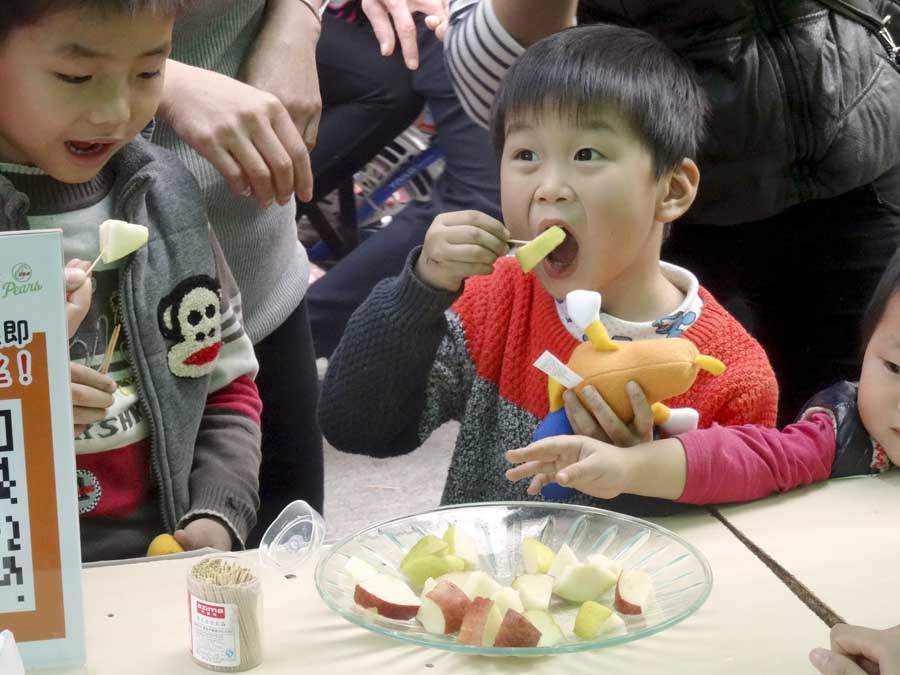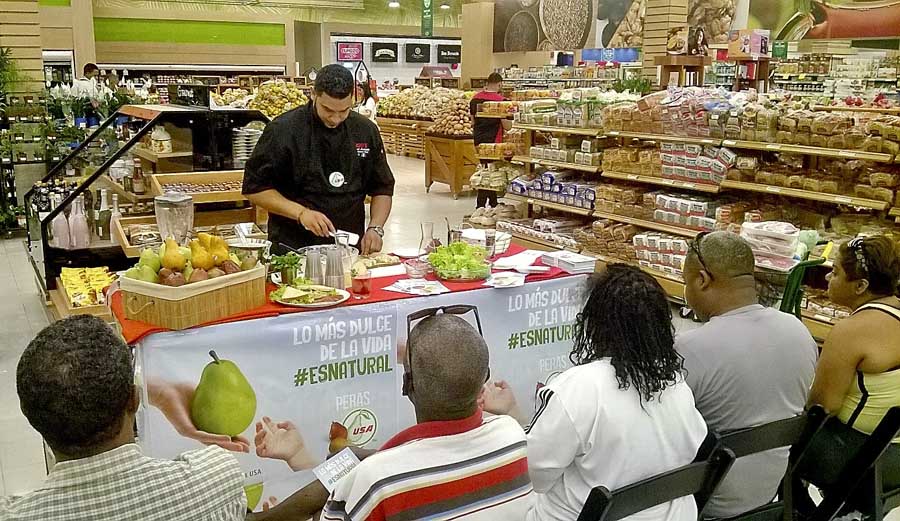
A boy chomps into a pear slice at a stop in China along the USA Pear Road Show, a promotion of Pear Bureau Northwest. In a routine vote, growers in Washington and Oregon are being asked to approve continuing the marketing order that allows such generic promotions. (Courtesy Pear Bureau Northwest)
Washington and Oregon pear growers will vote this year whether to continue the federal marketing order that allows them to collectively promote their fruit.
The measure, a referendum organized by the U.S. Department of Agriculture, is routine. It happens every six years. Supporters hope it stays routine.
“It’s in the best interest of all the growers,” said Ron Rivers, a grower in Parkdale, Oregon, in the Hood River Valley. “Because we have to work as a unit, a unified group.”
The fifth-generation grower is a board member of Pear Bureau Northwest, the Clackamas, Oregon, association that administers the marketing order. He produces 8 million pounds of pears, sending them to Duckwall Fruit for packing.
The measure takes on a different twist this year in the wake of the exit of organic growers.
In June last year, growers and packers who account for 93 percent of the Northwest’s organic pear production opted out of paying organic promotion assessments.
The bureau’s board of directors then chose to cease generic promotions of organic pears through advertisements, in-store samples and other marketing activities under the brand name USA Pears.
Organic pears represent about 6 percent of the Northwest’s average volume.
The exit, allowed under a clause of the 2014 Farm Bill, did not directly affect promotions of conventionally grown pears.
However, pear shippers now solely bearing the cost of their own organic promotions may be more likely to go it alone with their conventional marketing, too.
The dynamic this year is different than the industry has seen in the past, and it’s possible that shippers could choose to go it alone again, said Kevin Moffitt, president and CEO of Pear Bureau Northwest.
But Moffitt is urging growers to stick with the marketing order to help continue relatively good times for pears the past few years. “The pear industry is doing pretty well,” he said.
The efforts of the pear bureau are part of the reason, he said, but so is communication among sales teams and packing houses that fosters overall teamwork. “We’re all working together, and it’s shown to be effective,” Moffitt said.
A 2013 Washington State University economic evaluation of the marketing order’s effectiveness determined growers yield $7.68 in returns for every dollar spent on advertising and promotion on winter pears.
The history
The pear industry’s Marketing Order 927, established in 1939, is the nation’s longest running.
Under the order, shippers pay annual assessments of 44.9 cents per box — 38.5 cents toward marketing, 3.1 cents toward research and 3.3 cents toward administrative fees.
February’s referendum does not affect the rates, which are set by the committee at the annual meeting.
The referendum will be a simple yes or no vote — yes to continue the marketing order, no to discontinue.
A two-thirds majority by either number of growers or volume of production is needed to pass. If neither of those thresholds are met, the Agriculture Department will consider terminating the marketing order.
In 2011, the referendum passed comfortably, with 96 percent of the pear growers representing 88 percent of volume saying yes to continuing the marketing order.
The Pear Bureau Northwest has recommended the Agriculture Department hold the referendum in February.
The department will mail ballots to all commercial growers of fresh and processed pears in the two states.
The vote will affect both fresh and processed pears. Growers pay assessments for both.

A chef demonstrates recipes using fresh pears at a store in Latin America during a promotion organized by the Pear Bureau Northwest. In a routine vote, growers in Washington and Oregon are being asked to approve continuing the marketing order that allows such generic promotions. (Courtesy Pear Bureau Northwest)
While the Pear Bureau Northwest handles promotions for fresh pears, the Pacific Northwest Canned Pear Service promotes processed pears to both consumers, food service companies and government agencies such as school districts. Those venues require a collective message, as well, said B.J. Thurlby, president of the Canned Pear Service.
“The recent influx of Chinese-grown canned pears into the United States is making for a challenging environment for processor sales, and a strong ‘Buy USA’ message to the schools and other state and federal institutions is critical moving forward,” Thurlby said.
The Northwest’s three pear processors pay growers $340 per ton, an all-time high price. The price, negotiated by the Washington-Oregon Canning Pear Association, is not directly related to the marketing order, but speaks to the overall health of the industry that the order supports, Thurlby said.
Stemilt Growers, one of the largest pear shippers, favors the marketing order especially for its international marketing capabilities, said Mike Taylor, sales director of the Wenatchee, Washington, packer.
Stemilt has no pear orchards of its own, and therefore no vote in the referendum, but sells pears under the brand name Rushing River.
The company prefers doing that on its own in the domestic market but welcomes the collective approach internationally.
“The Pear Bureau is very good at it,” said Taylor, also a Pear Bureau board member.
Taylor specifically lauded the Pear Bureau’s ability to attract federal Market Access Program funds, distributed through the U.S. Department of Agriculture to trade groups to expanding exports of farm products.
In 2016, the program awarded Pear Bureau Northwest $3.1 million in Market Access Program funding. The Washington Apple Commission and Washington State Fruit Commission also received funding. •
– by Ross Courtney






Leave A Comment